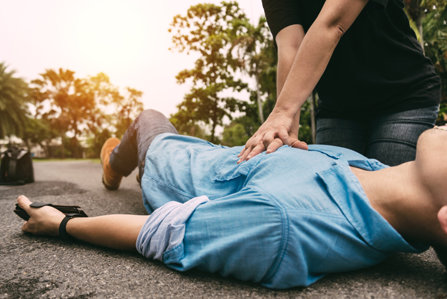How to Recognize Signs of an Opiate Overdose

Overdose is an unfortunate part of life these days. And I say it’s an unfortunate part of life because overdose affects more than just the people who use drugs. It affects moms, dads, sisters, brothers, and bystanders who find a person unconscious with a needle sticking out of their arm. While a loss of life due to drug use is unfortunate, the emotional scars and wreckage it leaves behind are just as bad. No family ever recovers from losing a loved one. The thing is, overdoses don’t just happen in the bathroom or bedroom at home. In fact, many people who overdose do so in public areas. Overdoses can happen in the grocery store, in the car, at a shopping mall… just about anywhere. It was just yesterday when I pulled into a Wal-Mart parking lot and found a guy unconscious in the car next to me. I banged on his window and luckily, he popped awake, confused as to why a stranger was concerned about him.
Many people out there don’t know how to recognize if a person is overdosing and if they are, what to do about it. Understanding and knowing the signs and symptoms of a drug overdose is essential in today’s society, given that so many people die every day.
What are opiates?
Opiates are narcotic, pain killing drugs that are originally derived from the opium poppy. Opiates range in strength and come in many different forms and varieties. The term “opioid” more often refers to synthetically produced compounds with opiate-like structures, but the two terms are usually used interchangeably.
Common opiates and opioids are:
- Heroin
- Vicodin (hydrocodone)
- Morphine
- OxyContin (oxycodone)
- “Roxies” (oxycodone)
- Dilaudid (hydromorphone)
- Opana (oxymorphone)
- Fentanyl
Opiates and opioids are some of the most commonly abused drugs today and more people than ever are finding themselves addicted to them. Whether they’re first given to them by a friend, family member, or a doctor, once taking the drugs, some people cease to be able to envision life without them. Just like any other drug, opiates and opioids can become a solution to a problem for people. No matter what the problem is, as soon as a person feels the drugs handled it for them better than anything else ever has, all bets are off and the addiction begins. After a person finds themselves addicted, they’ll continuously need a higher and higher dose of the drug in order to get the “benefits” of taking them. As their body gets used to a certain dose, eventually they’ll need more and more to get the desired effects. This is something known as tolerance. As addiction progresses, tolerance increases along with the possibility of overdose.
What is an overdose?
More often than not, overdoses happen by accident. Most people don’t intentionally overdose. As an addict’s tolerance gets higher and higher and they take more and more of their drug of choice, their body gets to the point where it can’t handle such a high concentration of drugs anymore and an overdose occurs. Also, with the popularity of heroin having soared over the past 15 years along with the introduction of fentanyl into heroin supplies, addicts really don’t know what they’re buying anymore. As if fentanyl alone was bad enough, currently we have a huge problem with fentanyl analogs or chemically altered versions that act similarly to fentanyl but have lots of unknown effects and strengths. These analogs are being created in mass quantities in China and illegally imported into the U.S. and mixed in with nearly all street drugs. Because this chemical is so strong, many unsuspecting drug users overdose who don’t realize what they’ve just bought. And the sick thing is, many of them don’t care. Once the withdrawals set in, so does desperation. Once the addict finally gets the ability to re-up their drug supply, their sole goal is to get as much of the drug into their body as quickly as possible to make the sickness go away. And a lot of the time, that turns deadly.

Signs of an opiate overdose
Overdoses happen when a person has taken more opiates (or opioids) than their body can handle. Overdoses can happen absolutely anywhere and it’s really important for everyone to know the symptoms of an overdose because then, the appropriate actions can be taken to save a person’s life.
Signs and symptoms of an opiate overdose can include:
- Limp body
- Pale face
- Clammy skin
- Purple or blue color to lips and fingernails
- Vomiting
- Pinpoint pupils
- Slowed or stopped breathing
- Unconsciousness/non-responsiveness
One of the most dangerous parts of an overdose is respiratory depression or arrest, which causes the blood to lose oxygenation and the possibility of hypoxia. As a result, permanent brain damage and death can occur.
What should you do if you see someone overdosing?
Acting quickly is essential and everyone needs to know how to handle an overdose. It can honestly mean the difference between life and death.
So, what’s the right thing to do in case of an overdose?
1. Check for responsiveness. If a person goes unconscious and is barely breathing, rub your knuckles hard over their chest and see if they respond. If they don’t, call 911.
2. Start performing CPR and rescue breathing. CPR and rescue breathing are vitally important to help someone through an overdose. Because they’re not breathing and getting enough oxygen, rescue breaths will help prevent death and brain damage.
3. Administer Narcan. Narcan is a brand name of the opiate-reversal drug Naloxone. It stops the action of the opiates a person has taken and gets them to start breathing again and to come out of the overdose. Narcan can be purchased at any pharmacy in most states.
Understanding overdose is vitally important. The more people who know how to properly handle an overdose the better because you never know when your loved one might need to be saved. And don’t let fear get in the way of you helping someone who’s overdosing. Good Samaritan laws exist to protect those trying to help others in need, so check your local and state laws. If you or a loved one is struggling with opiate addiction, don’t wait for them to overdose to get them treatment. Get them help and into drug rehab before it’s too late.
Sources Used:
https://drugabuse.com/taking-action-how-to-intervene-during-an-overdose/
